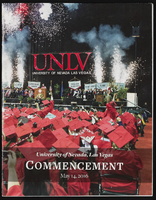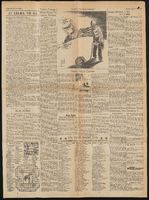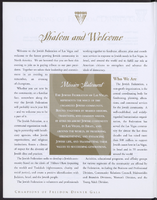Search the Special Collections and Archives Portal
Search Results

University of Nevada, Las Vegas (UNLV) Spring 2016 commencement program
Date
Archival Collection
Description
Commencement program from University of Nevada, Las Vegas Commencement Programs and Graduation Lists (UA-00115).
Text

Pom Fritz oral history interview: transcript
Date
Archival Collection
Description
Oral history interview with Pom Fritz conducted by Kristel Peralta and Stefani Evans on June 8, 2021 for Reflections: The Las Vegas Asian American and Pacific Islander Oral History Project. Pom talks about her family and upbringing in Udon Thani, Thailand and her immigration to the United States with her second husband, an American citizen, in 1972. She discusses living on Air Force bases in North Carolina and California before moving to Las Vegas and finding work at different hotels. Pom shares her experiences as a member, steward, and executive board representative of the Culinary Workers Union and what she recalls from the Frontier Strike. She also talks about her children and grandchildren, some of whom still live in Thailand.
Text

Transcript of interview with Elton Garrett by Alan Gurwitz, March 1, 1981
Date
Archival Collection
Description
On March 1, 1981, Alan Gurwitz interviewed Elton Garrett (born 1902 in St. Joseph, Missouri) about his experiences in Southern Nevada and more specifically his work in Boulder City. Garrett first talks about the development of Boulder City from its inception in 1931 and how it has grown throughout nearly fifty years. He also discusses his work in journalism for the Boulder City Journal, the building of Boulder Dam, and atomic testing at the Nevada Test Site. The second part of the interview involves a discussion of the founders of Nevada Southern University, Garrett’s work on legislative committees, and his work as a schoolteacher and school principal. The interview concludes with Garrett’s thoughts on the future of Boulder City and its continued growth.
Text

Transcript of interview with Mary Kreuzer by Patricia Kohlman, December 15, 1975
Date
Archival Collection
Description
On December 15, 1975, Patricia Kohlman interviewed Mary Kreuzer (born 1923 in Las Vegas, Nevada) in her home in Las Vegas. The two discuss Kreuzer’s childhood, as well as the different addresses that she’s lived at in Las Vegas. The interview concludes with a discussion on entertainment and small businesses before the population boom in Southern Nevada.
Text

Transcript of interview with Joe Lappin by Gordon Brusso, March 4, 1976
Date
Archival Collection
Description
On March 4, 1976, Gordon Brusso interviewed former miner, Joe Lappin (born November 14th, 1914 in Santa Paula, California) about his life in Boulder City, Nevada. The two discuss his early occupational history and his work for the Bureau of Mines. He then goes on to explain the different housing systems that developed in Boulder City during World War Two.
Text

Transcript of interview with Eldon Cunningham by Randall L. Williams, March 14, 1981
Date
Description
On March 14, 1981, Randall Williams interviewed Eldon Cunningham (born 1920 in Granby, Missouri) about his life in Las Vegas, Nevada. Cunningham first talks about his family background, his reason for moving to Las Vegas, and his service in the military during World War II. He also mentions the Twin Lakes area of Las Vegas, his hobby of prospecting, and his work with Clark County Electric as an electrician. Cunningham also talks in detail about some of his experiences while working at the Nevada Test Site in electrical work. As the interview concludes, Cunningham talks more about family illnesses, experiments at the Test Site, and his former hunting practices.
Text

Transcript of interview with Hal G. Curtis by Bill Teepe, February 24, 1977
Date
Archival Collection
Description
On February 24, 1977, Bill Teepe interviewed Hal G. Curtis (born 1926 in Galt City, California) about his life in Southern Nevada. Curtis talks first about his work on the Union Pacific Railroad before discussing changes and development in Las Vegas, including development on the Strip and Downtown areas. He also talks about Block 16, the El Rancho Vegas fire, social clubs, and religion.
Text

Howard Heckethorn interview, February 15, 1979: transcript
Date
Archival Collection
Description
On February 15, 1979, collector Richard Eitland interviewed Howard Heckethorn (born September 14th, 1922 in St. George, Utah) at Red Rock Elementary School in Las Vegas, Nevada. Mr. Heckethorn discusses going to school in the early days of Las Vegas, Nevada. He also talks about many notable teachers he had, as well as the development of the Las Vegas area.
Text


